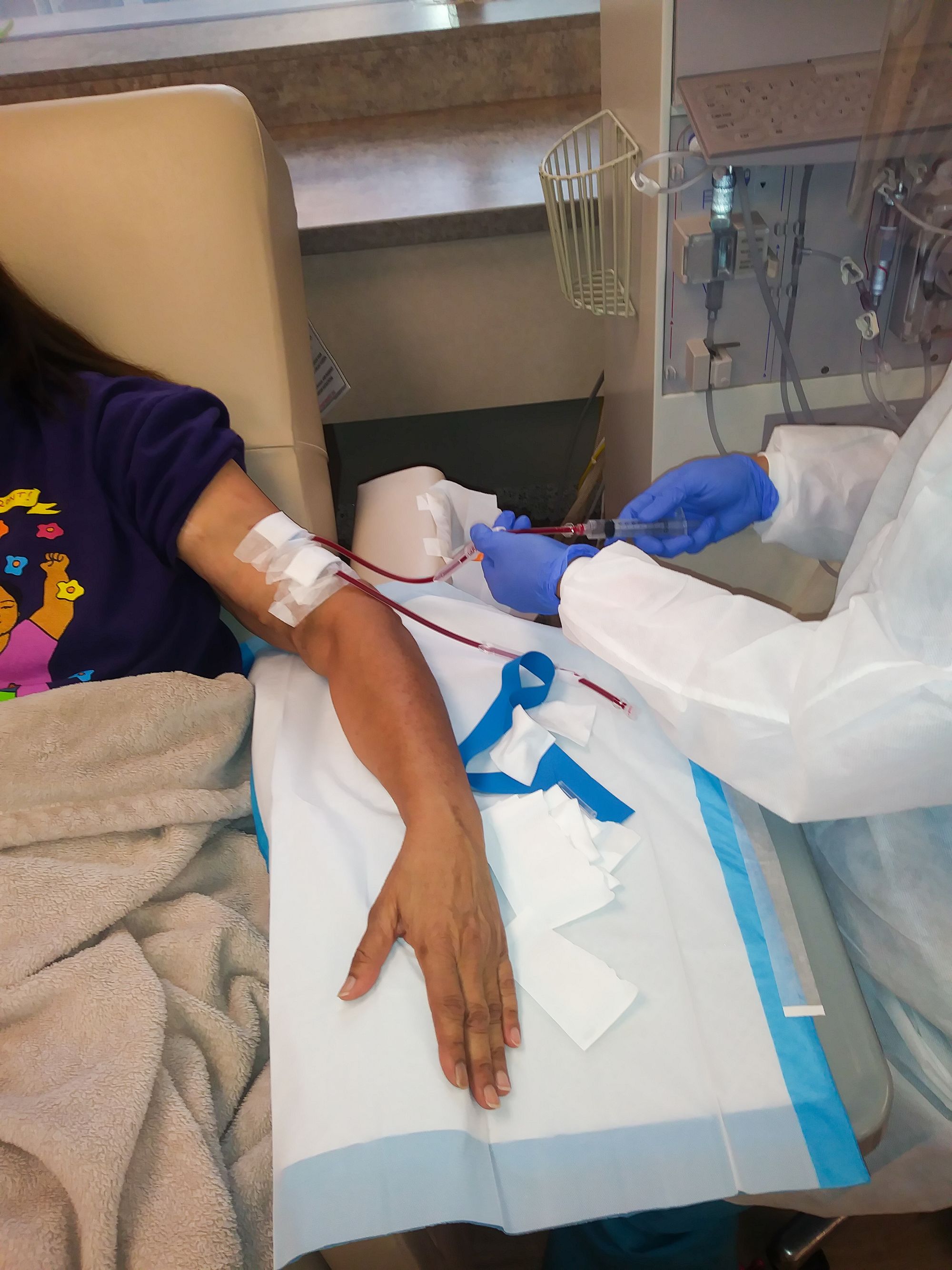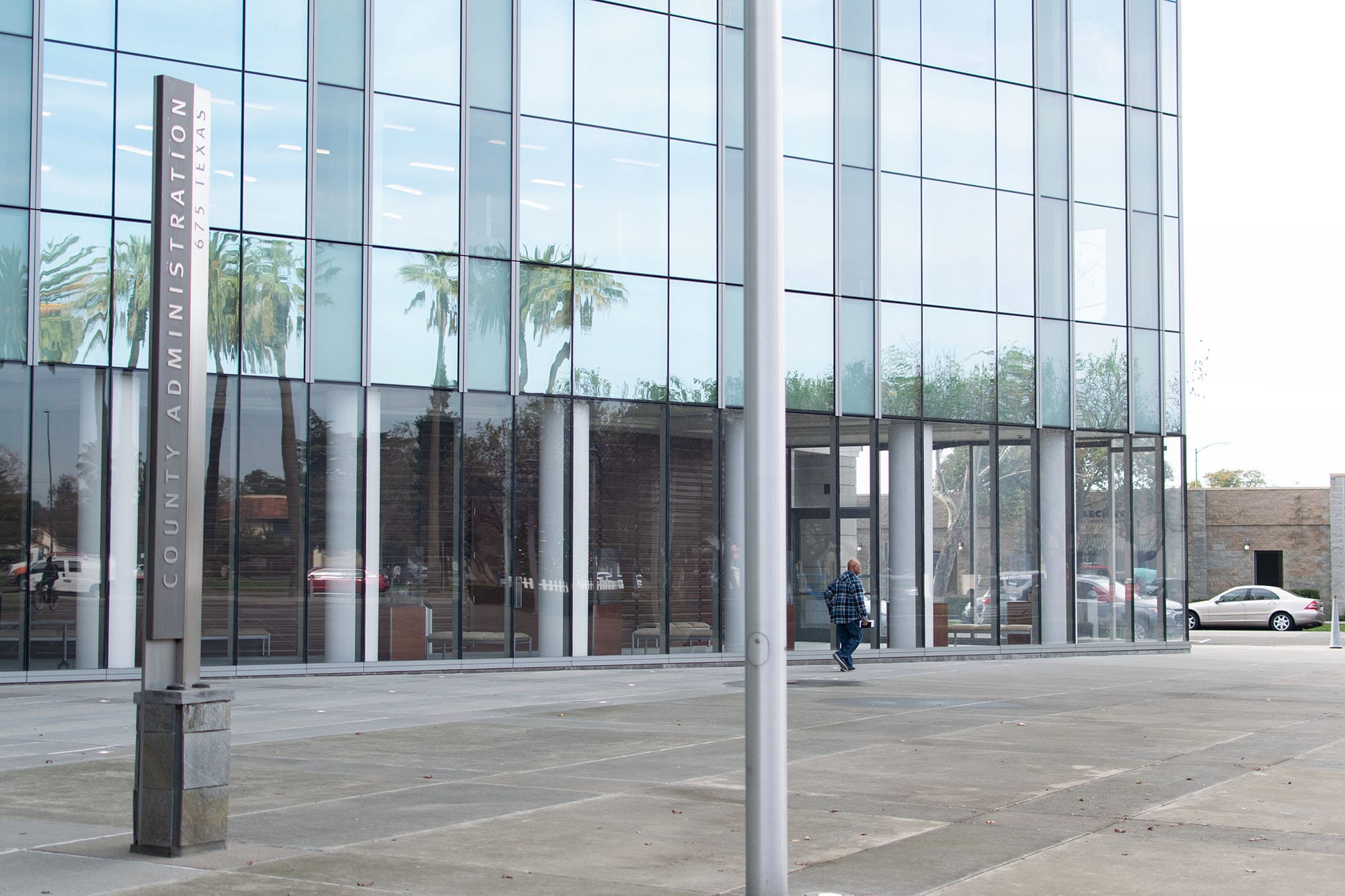VALLEJO – Workers at the Satellite Healthcare Vallejo dialysis clinic are organizing a union, saying that low wages have led to staffing challenges that make their work to provide life-saving treatment to patients unsustainable.
The workers filed a petition to unionize to the National Labor Relations Board (NLRB) on March 9, and a union election is set for April 20 and 21.
The Vallejo site is one of more than 7,500 dialysis clinics in the country where patients with failed or damaged kidneys get treatment to eliminate waste and excess water from their blood. Without dialysis treatment, over half a million U.S. residents could die of kidney failure.
Dialysis technicians are the majority of the workers at such clinics and receive the least pay. They access people’s blood, operate dialysis machines, and interact with and advise patients during treatment. Techs must receive training and certification for the job which can take over a year to complete. Dialysis techs at Satellite Vallejo hope to include other non-managerial workers, such as nurses, in the union as well.
“We love what we do but we need to do it properly,” said Dennis Torres, who has worked as a dialysis tech for 20 years, including eight at Satellite Vallejo. “The only way to do that is to be fairly compensated.”
The Vallejo Sun sent Satellite Healthcare – a nonprofit company which operates more than 90 dialysis clinics in seven states – detailed questions about wages, working conditions, and unionization efforts at the Vallejo clinic. Company spokesperson Patrice Smith said in an email that Satellite “is committed to treating our employees with the utmost dignity and respect,” and that it “respects our employees’ choices and rights, including the right to participate in union organizing.”
Clinic staffers are attempting to unionize through Service Employees International Union - United Healthcare Workers (SEIU - UHW), a union that represents over 100,000 healthcare workers across California, including dialysis tech workers in Kaiser Permanente facilities. The unionized dialysis workers at Kaiser, which has a site in Vallejo, make more than those at Satellite.
According to the SEIU’s research, the average dialysis tech at Satellite’s clinics makes $24 dollars per hour, but at Kaiser’s facilities the union contract stipulates that techs start at $33.80 per hour, while those with more than ten years experience make around $44 dollars per hour.
Dialysis tech Mark Calma said that he has worked for three years at Satellite Vallejo and 15 years at other clinics. He makes $28 per hour and feels the wage makes it difficult for him to take care of his family.
“I have to keep up with inflation,” he said. “I have two daughters and they have needs.”
Both Torres and Calma told The Vallejo Sun that their low wages have contributed to high worker turnover and short staffing, which has led to overwork and unnecessary exhaustion. Calma works three to four days a week and said his shifts at Satellite used to last 12 hours, but since the pandemic started, workers have left and gotten sick more often. These days, he works 14 to 15-hour shifts to make up for the clinic being short handed.
“After 12 hours the judgment and exhaustion and plan overwork gives you a brain fog and your thinking process is damaged,” Calma said.
With less support, Calma feels the clinic has become less safe for patients. Workers at the site rotate to different patients to monitor vital signs, making sure they are safe. But when the patient to worker ratio is too low, he and his co-workers can’t always adequately keep an eye on everyone.
“We can’t monitor patients as well when we’re spread thin, so they pass out, sometimes we have to call 911,” said Calma. “All that happens more often when we’re short staffed. And we’re short staffed a lot.”
Torres told The Vallejo Sun that he and his co-workers want to “humanize dialysis.” Most dialysis patients require treatment three times a week, with each session lasting over three hours. Due to the chronic nature of the treatment and potential for discomfort, he wants patients to be able to keep seeing the same workers in order to build relationships. He finds it important to have space to joke around and talk with them, and educate them about taking better care of themselves.

But Torres said he thinks the wages at Satellite Vallejo aren’t high enough to keep and attract enough staff. So he and his co-workers are overworked, rushed, and can’t adequately provide care for patients.
“It’s been harder to keep staff and acquire new staff because the pay is so low,” he said. “This is very important to us not just for the money but for the patients in this community. Why should they be treated like they’re in an assembly line?”
Satellite Vallejo is not the only dialysis clinic in California that is attempting to unionize, or has already done so.
According to SEIU - UHW spokesperson Renée Saldaña, workers in California dialysis clinics started organizing in 2017, but it has taken a long time due to high worker turnover. The COVID-19 pandemic, though, has made wage and staffing issues worse, and inspired more workers to seek unionization.
“When people leave the clinics you have to start anew,” Saldaña said. “But the biggest difference now is workers are fed up and fired up.”
Since November, clinics in over a dozen cities, such as San Diego, Antioch, Gilroy and San Francisco, have successfully formed unions. Around a half-dozen more clinics have also petitioned the NLRB to unionize. Workers at some of these sites have said they have pursued unionization due to increased workload, loss of benefits, unsafe working conditions, and low pay.
The majority of these unions have formed or are attempting to form at clinics owned by DeVita and Fresenius, for-profit companies that operate about three-quarters of California’s dialysis clinics, but also four Satellite Healthcare clinics have unionized.
Torres said he got the idea to try to unionize the Satellite Vallejo clinic in late December, when Satellite CEO Jeff Goffman and President Bernadette Vincent sent staff an email informing them that workers at other sites had formed unions.
“When we got that company email we said we’re happy to negotiate,” said Torres. “It’s kind of funny how it landed in our laps.”
Torres said that Satellite has not been receptive to his and his co-workers’ unionization efforts, leading the workers to file an unfair labor practice charge with the NLRB on April 3. The charge accuses Satellite of making “coercive statements” after a manager threatened the workers’ jobs, to close the clinic, and told workers that “employees that support unions are blacklisted in the dialysis community,” according to Torres.
Satellite has also hired The Crossroads Group Labor Relations Consultants “to assist the employer in its communications efforts” and “furnish [employees] with information regarding third-party representation,” according to a report filed with the U.S. Department of Labor.
Miko Penn, a consultant with Crossroads, gave a presentation related to unions in late December to workers at Satellite Vallejo. Torres said the presentation emphasized “negative union scenarios.” After that, Penn came back to the clinic multiple times to answer questions about unions. A representative for Crossroads referred questions to Satellite.
Saldaña told The Vallejo Sun that she feels dialysis workers deserve higher wages, which dialysis companies can afford to pay.
“This is a very lucrative industry,” she said. “The workers are providing life saving treatments, and some of them are getting less than $50,000 a year.”
Dialysis providers made nearly $26 billion in 2020. According to Satellite’s most recently available 990 tax form from 2019, executives are paid 12 to 28 times what its average dialysis techs make. Its former CEO made over $1.4 million that year and five other executives made about $600,000 or higher. A half-dozen others made between $67,000 and $87,000 dollars to work three hours per week. Satellite is also paying Crossroads at least $425 an hour for their consulting services.
Calma said that he and his co-workers have voiced concerns about wages and understaffing in the past but it hasn’t caused any changes. They hope unionizing will be more effective.
“We voiced our concerns to upper management but we feel we weren’t heard,” he said. “We feel like unionizing will be the best route.”
Before you go...
It’s expensive to produce the kind of high-quality journalism we do at the Vallejo Sun. And we rely on reader support so we can keep publishing.
If you enjoy our regular beat reporting, in-depth investigations, and deep-dive podcast episodes, chip in so we can keep doing this work and bringing you the journalism you rely on.
Click here to become a sustaining member of our newsroom.
THE VALLEJO SUN NEWSLETTER
Investigative reporting, regular updates, events and more
- health
- labor
- business
- Vallejo
- Satellite Healthcare
- SEIU
- Kaiser Permanente
- Dennis Torres
- Mark Calma
- Renée Saldaña
- National Labor Relations Board
- Jeff Goffman
- Bernadette Vincent
- Crossroads Group
- Miko Penn

Zack Haber
Zack Haber is an Oakland journalist and poet who covers labor, housing, schools, arts and more. They have written for the Oakland Post, Oaklandside and the Appeal.
follow me :




